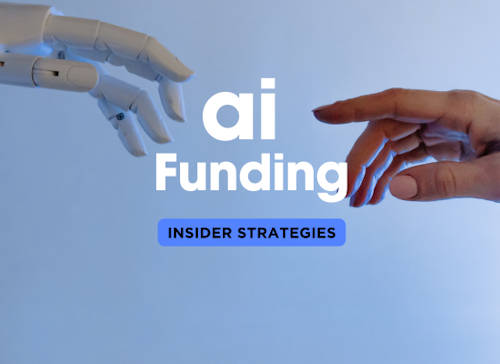The rise of artificial intelligence (AI) is reshaping industries and creating unprecedented opportunities for innovation. However, launching and scaling an AI startup requires significant capital investment, from hiring top talent to acquiring powerful computing resources. Securing the right funding is crucial to turning groundbreaking ideas into viable products and services. Whether you’re in the early stages of developing an AI solution or looking to expand your market presence, these tailored funding options can provide the financial boost your AI startup needs to succeed in this competitive landscape.
Hint! Make it to the end for Insider Tips
| IncBook: AI Startups Business Funding | |||||
|---|---|---|---|---|---|
| Title | Description | Amount | Rate | Pros | Cons |
| Venture Capital for AI Startups | Investment from venture capital firms that specialize in funding AI-driven businesses, providing significant capital in exchange for equity. | $500,000 – $10,000,000+ | N/A | Access to large amounts of capital; strategic guidance from experienced investors. | Equity dilution; high expectations for rapid growth. |
| AI-Specific Grants | Grants offered by government agencies and private organizations specifically for AI research and development. | $50,000 – $2,000,000 | N/A | No repayment required; boosts credibility and visibility. | Highly competitive; strict eligibility and reporting requirements. |
| Angel Investors in AI | Individual investors who provide early-stage capital for AI startups in exchange for equity or convertible debt. | $50,000 – $1,000,000 | N/A | Flexible terms; access to a network of mentors and advisors. | Equity dilution; varying levels of investor involvement. |
| Corporate Venture Funding | Investment from large corporations looking to support AI innovation, often with strategic partnerships in mind. | $100,000 – $5,000,000+ | N/A | Potential for strategic partnerships; access to corporate resources. | Alignment with corporate goals; possible conflicts of interest. |
| AI-Focused Accelerator Programs | Accelerator programs that provide seed funding, mentorship, and resources specifically for AI startups. | $25,000 – $150,000 | N/A | Access to mentorship and resources; networking opportunities. | Equity stake required; intense program expectations. |
| Revenue-Based Financing | Flexible financing where repayments are tied to the startup’s revenue, offering a non-dilutive alternative to traditional loans. | $100,000 – $2,000,000 | Varies | No equity dilution; repayments scale with revenue. | Higher overall cost; repayment linked to revenue fluctuations. |
Insider Tips
#1. Highlight AI’s Impact on Core Business Functions: When pitching to investors or lenders, emphasize how your AI technology will revolutionize key business functions, such as predictive analytics, automation, or customer engagement. Demonstrating the practical, real-world impact of your AI solution can make your startup more appealing to investors who are looking for tangible returns on their investment.
#2. Tap into AI Research Grants: Many governments and academic institutions offer research grants specifically for AI development. These grants are often underutilized by startups focused solely on private investment. Applying for these grants can provide non-dilutive funding and also lend credibility to your technology.
#3. Develop Strategic Corporate Partnerships Early: Large tech companies are increasingly interested in acquiring or partnering with innovative AI startups. Approach potential corporate partners not just for investment but for strategic alliances that can provide resources, data, and market access. These partnerships can also make your startup more attractive to other investors.
#4. Utilize AI-Focused Accelerators for Early Traction: Join AI-specific accelerator programs that not only provide seed funding but also offer mentorship from AI experts, access to proprietary datasets, and connections to key industry players. These accelerators can help you refine your technology and go-to-market strategy, making your startup more competitive in the funding landscape.
#5. Leverage Cloud Credits from Tech Giants: Companies like Amazon Web Services (AWS), Google Cloud, and Microsoft Azure offer cloud credits to startups, particularly those in the AI space. These credits can significantly reduce your operating costs, freeing up capital for other areas of development. Highlighting your partnership with these tech giants can also impress investors.
#6. Secure Early Clients to Validate Your AI Solution: Before seeking major funding, try to secure early clients or pilot projects that validate your AI technology. Demonstrating market demand through paying customers or successful pilots can make your startup more attractive to investors, showing that there is a real need for your solution.
#7. Focus on Explainable AI (XAI) to Attract Ethical Investors: As concerns about AI ethics grow, focusing on Explainable AI (XAI) can set your startup apart. Investors who prioritize ethical AI will be more interested in funding a company that is not only innovative but also transparent and responsible in its AI development.
#8. Pitch AI as a Service (AIaaS) for Recurring Revenue Models: AI startups that offer their technology as a service (AIaaS) can benefit from recurring revenue models, which are highly attractive to investors. Highlighting the scalability and subscription-based income potential of your AI solution can make your startup more appealing.
#9. Build a Diverse, Multidisciplinary Team: Investors in the AI space are increasingly looking for teams that combine technical expertise with industry knowledge, ethical considerations, and business acumen. Building a diverse team with these skills can set your startup apart and increase your chances of securing funding.
#10. Engage with AI Research Communities: Actively participate in AI research communities and conferences. Not only can this help you stay on the cutting edge of AI developments, but it also provides opportunities to connect with potential investors who are deeply embedded in the AI ecosystem. Networking in these circles can lead to valuable funding opportunities and partnerships.



